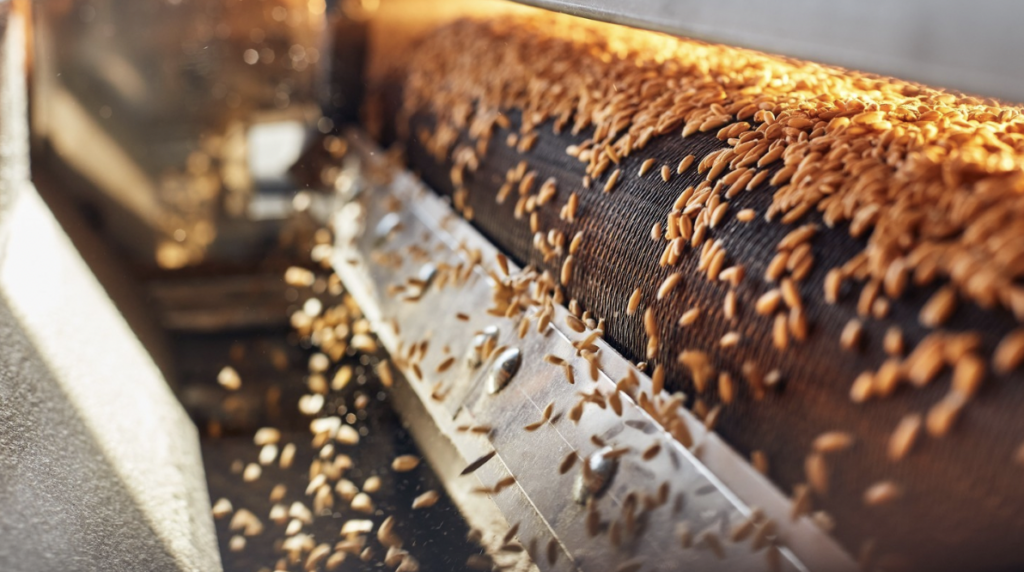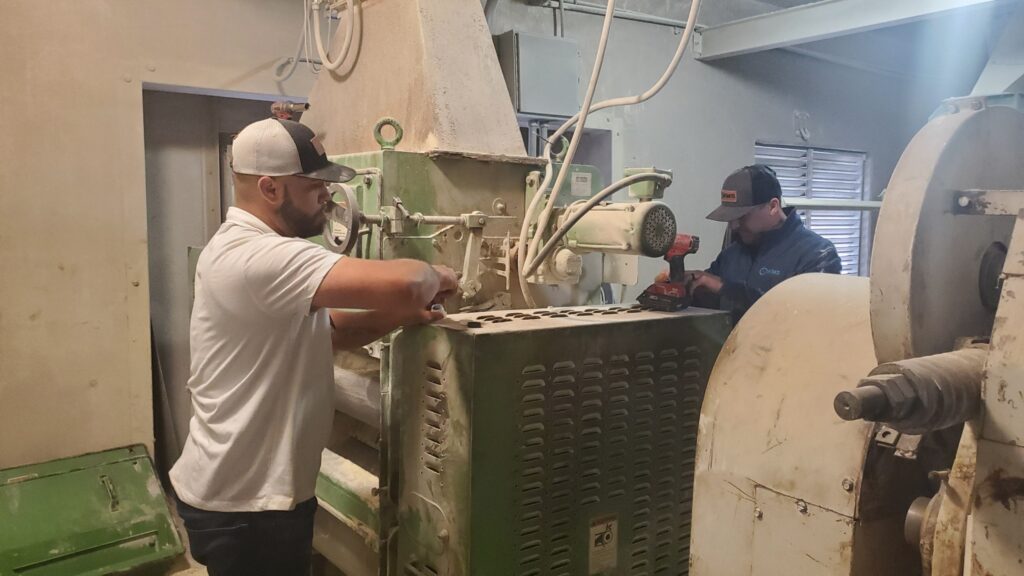An automatic bearing greaser—also sometimes called an auto greaser or a bearing lubricator—is a device used to automatically lubricate rolling bearings in machinery and equipment like a roller mill. This innovative system ensures the proper lubrication of bearings, reducing the risk of premature bearing failure, and increasing machine reliability.
By continuously supplying the correct amount of grease to the bearing, an automatic bearing greaser helps maintain optimal lubrication conditions. This helps reduce friction and heat generation, preventing wear and extending the lifespan of the bearing.
The Benefits of Automatic Lubricators
Traditional manual lubrication methods can be time-consuming, require frequent maintenance, and may be prone to human error. With an automatic bearing greaser, the lubrication process is automated, reducing labor costs and eliminating the need for manual application.
 An automatic greaser for bearings, such as the RMS Auto Greaser & Bearing Monitoring System, offer numerous benefits in industries that rely heavily on bearings throughout their production processes. In particular, industries like Ag Feed, Brewing, and Soybean Processing can benefit greatly from automatic lubricators.
An automatic greaser for bearings, such as the RMS Auto Greaser & Bearing Monitoring System, offer numerous benefits in industries that rely heavily on bearings throughout their production processes. In particular, industries like Ag Feed, Brewing, and Soybean Processing can benefit greatly from automatic lubricators.
One key advantage is the improved machine reliability. Roller mills are often exposed to heavy loads, high temperatures, and harsh environments, making them prone to premature bearing failures.
By ensuring a continuous supply of the correct quantity of lubrication, an automatic lubricator helps reduce friction and heat, thereby preventing wear.
Additionally, an automatic bearing greaser can help optimize lubrication application minimizing the risk of issues such as over-lubrication or under-lubrication. This oversight helps maintain optimal machine conditions, and further extends the service life of the bearings.
Bearing Condition Monitoring: Ensuring Optimal Performance and Reliability
Along with lubrication, regularly monitoring a roller mill’s bearings is essential to ensure optimal performance and avoid costly breakdowns. With the conditions that roller mills are frequently subjected to—including heavy loads and high temperatures—bearing failure can occur unexpectedly if not properly addressed.

Bearing monitoring can be easily overlooked. However, staying on top of this seemingly simple task has been proven to help prevent devastating failures and unplanned downtime. For example:
- 80% of the bearing failures RMS responds to are the result of a lubrication or contamination issue.
- 25% of those failures have also led to damage to the bearing and shaft/journal.
A bearing condition monitoring system can play a vital role in identifying potential issues before they lead to catastrophic failures. By continuously monitoring key parameters such as vibration, temperature, and lubrication condition, the system can provide real-time insights into the health of the bearings.
In addition to preventing unplanned breakdowns, a bearing monitoring system can also help optimize the maintenance schedule. Instead of relying on fixed time intervals for maintenance, which can be inefficient and costly, the system initiates maintenance only when necessary. This approach maximizes bearing life, reduces maintenance costs, and minimizes disruptions to production
Questions to Ask Yourself (the L.I.C. Principle)
Most bearing failures can be attributed to one or more factors under the L.I.C. Principle: Lubrication, Installation, and Contamination. These principle deficiencies can significantly impact the lifespan and performance of bearings if not addressed.
- Lubrication is a critical factor that directly affects bearing health. Are the bearings receiving enough or too much grease? Both scenarios can lead to premature failure. Additionally, it is good to check that the bearings receive the correct type of grease for their specific application.
- Installation that’s done properly is another key consideration. Are the bearings being installed according to the manufacturer’s requirements? Following the correct procedures and recommendations ensures optimal performance and longevity.
- Contamination can also significantly impact bearing performance. Are fines or dust particles able to find their way into the bearing housing? Additionally, preventing non-compatible greases from mixing is essential since this can also have detrimental effects on the bearings.
By asking yourself these questions and addressing any deficiencies, you can significantly improve the reliability and longevity of your bearings.
Proper lubrication, installation, and contamination control are essential for maximizing the performance and lifespan of bearings in various applications.
Learn More About RMS Roller-Grinder
RMS Roller-Grinder builds and services the best roller mills and accessories for all our customers’ unique grinding applications. We engineer our equipment to maximize productivity and minimize maintenance time, providing superior value to customers across numerous industries.
Our products utilize advanced technology, accurate measurements, and innovative design to deliver flawless performance and reliable operation. Our team of experts offer a comprehensive list of services, from installation and training to technical support and repair.

